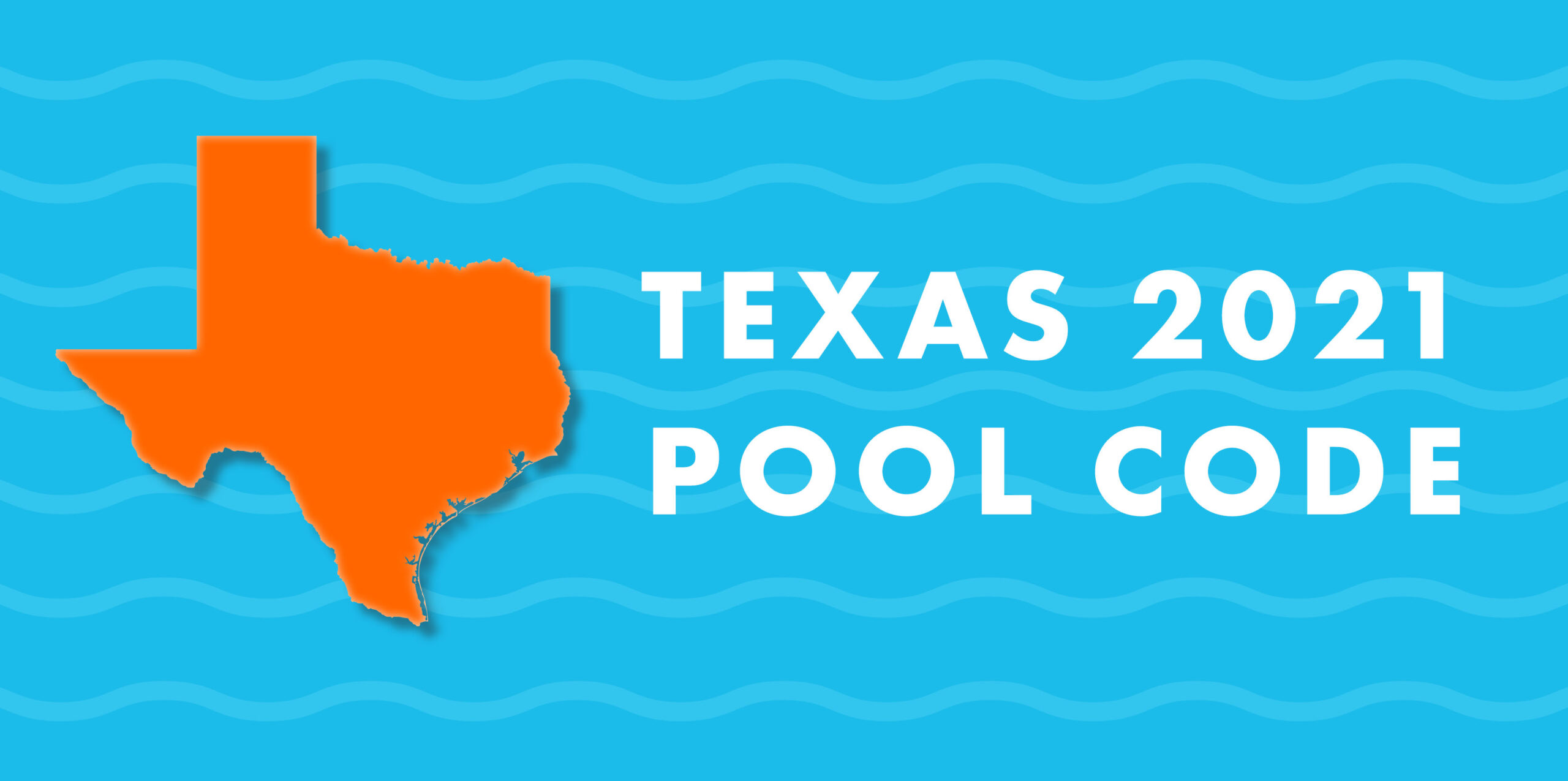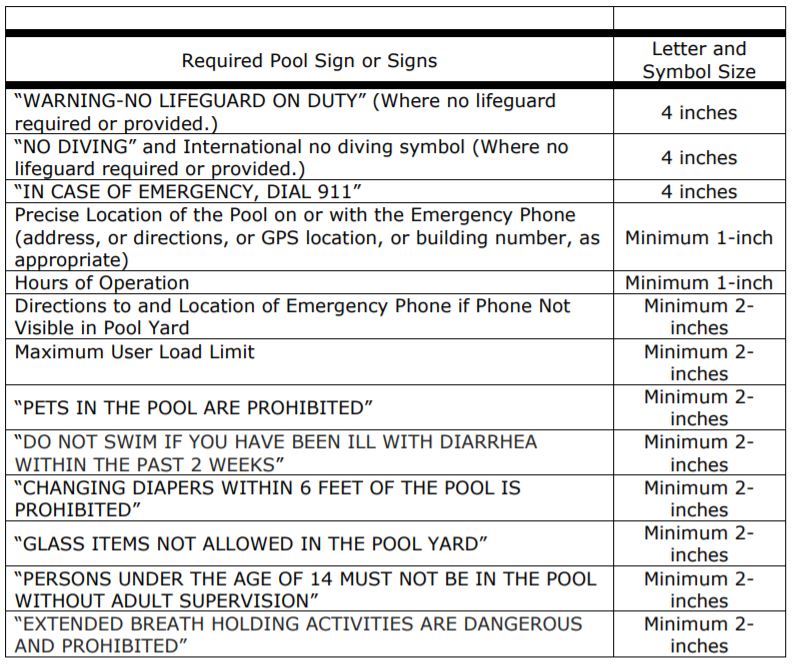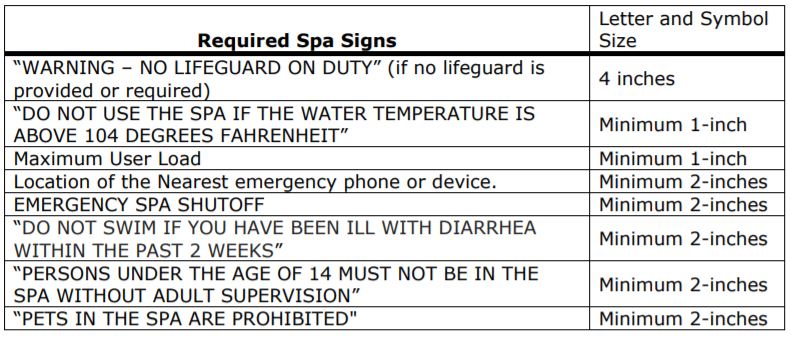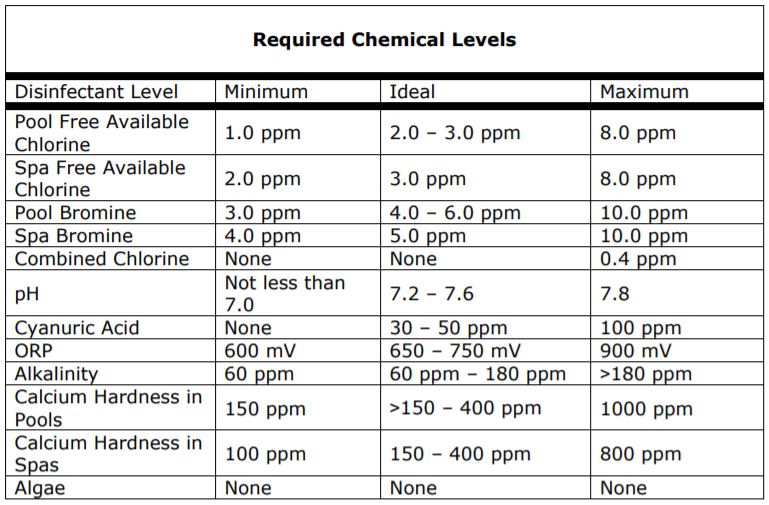Texas Pool Code 2021
Summary of operational requirements for Class C pools, including pools belonging to multifamily, hotels, clubs, and schools.

This article summarizes the areas in this code pertaining to pool maintenance, specifically in the areas of chemical balance, operator training, and general maintenance of the water and pool equipment for swimmer safety. We’ve broken down the operational regulations into four parts:
Our summary will focus primarily on the requirements of Class C pools, which includes pools operated at hotels, apartments, clubs, and schools. The full TX pool code includes Class A, Class B, and Class C pools, and defines many other regulations beyond the scope of Poolsure, such as construction standards for different types of pools. We recommend reviewing the TX pool code in its entirety to ensure full compliance with these new regulations.
1. Clarity Regulations
The TX pool code requires that clarity regulations must be maintained all year round.
What is “clarity”?
Clarity is achieved when all of the following are true:
- The bottom of the pool is clearly visible.
- Any main drains can be clearly seen from the edge of the pool.
- There is no sediment or other debris obviously visible. This should be checked when the pool opens and periodically while the pool is in use.
Clarity involves preventing algae growth, which is achieved through effective pool sanitation. The pool is never allowed to give off any objectionable odors or create any other type of nuisance condition or hazard.
How can we measure clarity?
Clarity can be easily measured using an 8-inch black disk or Secchi Disk. If the disk is placed on the floor at the deepest part of the pool, a person standing on the deck closest to the disk should be able to see it clearly.
Clarity is one indicator of a healthy pool. However, pools that have achieved clarity are not necessarily healthy. For your pool to be healthy and safe for swimming, proper sanitation and chemical balance are essential as well.
2. Safety Equipment Regulations
Equipment regulations have been introduced in the new TX pool code.
Required Signage: The new TX pool code defines a list of signs that are needed at each commercial pool or spa. The full lists of required signs can be found below:


If your property is located somewhere with a large non-English speaking population, signs and related information may be posted in the predominant language alongside their English counterparts.
Required Labeling: Pipes, bulk chemical tanks.
All chemical bulk and day tanks are required to be clearly labeled with the tank’s contents.
All pipes are required to be permanently labeled with both the piping function and the direction of flow, regardless of the date of construction. This includes labeling the specific liquid or gas passing through each pipe and using arrows to indicate flow direction.
Safety Equipment:
- Skimmer weirs: every pool is required to have a weir for every skimmer. The skimmer weir must adjust automatically to variations in water level over a minimum range of 4 inches.
- Ring buoy, throw rope, and reaching poles: every pool is required to have a ring buoy with throwing rope and a reaching pole for every 2000 square feet of pool surface area up to 6000 square feet. After that, another set of each item is required for every additional 4000 square feet of surface area. All three of these items need to be visible and easily accessible from anywhere in the pool yard.
- Break-resistant thermometer for spas: every spa is required to have a break-resistant thermometer (with a tolerance of +/- 1 degree Fahrenheit) that is designed for use in a spa environment and available for patrons and staff to monitor spa temperature.
- Emergency summoning device (ex: phone): every pool is required to have an emergency phone or other emergency summoning device that is easily accessible and capable of contacting emergency services such as 911 dispatch. This device should be kept within 200 ft of the pool, clearly labeled, and visible to users. A sign should be hung above this phone to indicate your property’s contact information and address.
3. Training Regulations
A certified pool operator is required to supervise all pools.
All pools are required to be maintained under the supervision or direction of a properly trained and certified pool operator. The certified pool operator’s name and contact information should be made available to on-site staff, property management, and any regulatory authority when requested.
The certified operator is not required to be on site at all times, but on-site staff should be properly trained in daily pool and spa operations and maintenance.
How can someone become a certified pool operator?
There are official pool operator courses offered through various organizations that are approved for certification. Approved pool operator certification courses are:
- NRPA: Aquatic Facility Operator
- PHTA: Certified Pool Operator
- ASPSA: Licensed Aquatic Facility Technician
While Covid-19 precautions are being taken, we have temporarily suspended our CPO course schedule. We do keep a waiting list for interested CPO attendees, so please let us know via a contact form if you would like to be notified once classes resume.
Safety requirements for pool operators.
Maintenance staff in charge of maintaining a pool or spa are required to be trained in pool sanitation and disinfection (more in “Chemical Regulations” section).
In addition to this training, maintenance staff should also be provided with:
- appropriate PPE, including rubber gloves and goggles
- safety information related to the property, such as emergency procedures
- safety data sheets of all on-site pool chemicals, which should be readily available
4. Chemical Regulations
The required chemical ranges have been updated in the new TX pool code. The official chemical chart is below:

What are the required testing frequencies for each chemical parameter?
- pH: daily
- FAC: daily
- CC: daily
- CYA: weekly
- ALK: monthly (recommended weekly)
- CH: monthly (recommended weekly)
- Other water balance chemicals: monthly (recommended weekly)
The Langelier Saturation Index (LSI or SI) is required to be calculated every 10 days while the pool is open. We recommend doing this weekly to correspond with CYA testing.
All chemical levels must be recorded in a pool log when tested.
What are the pool log rules?
For Class C pools that do not have on-site staff primarily responsible for pool and spa operations (such as lifeguards), a manual test for pH and disinfectant must be performed and logged at least once per day.
If the system used to control pH and disinfectant levels can electronically transmit the pH and ORP (mV) or FAC levels to the certified pool operator at least once a day, a manual test can be performed once a week instead.
Pool log records dating back two years should be accessible and made available upon request within 5 business days.
Pool chemical testing methods:
A reliable means of testing pool chemicals must be provided at the pool or spa. Free available chlorine levels and bromine levels should be determined by the use of the DPD method.
Test kits and reagents should be stored according to the manufacturer’s instructions. Choose a location that is protected from extreme temperatures, exposure to water and chemical products, or any other situation that could negatively affect test results. Reagents found in these test kits should be replaced per instructions to ensure accurate results.
Pool sanitization methods: chemical feed equipment and hand distribution
Chemical feed equipment for pool and spa disinfection and pH control must be installed at each property. This ensures that each pool or spa can achieve continuous and effective disinfection under all conditions. This equipment must meet NSF Standard 50 and include failure-proof features to prevent unsafe chemical mixing and chemical injection.
When hand distribution of chemicals is required, swimmers are required to leave the pool or spa. Before allowing swimmers to reenter the pool, the following must occur:
- Disinfectant levels and pH should be tested again 30 minutes after hand distribution.
- If the disinfectant levels and pH are within the required ranges, swimmers can return. If not, adjust again and repeat from the previous step.
What qualifies as a primary sanitizer or disinfectant agent for your pool?
Pools and spas must be continuously disinfected by a disinfectant agent, chlorine or bromine, with a residual that can be easily measured. This disinfectant should be EPA-registered for use in pools and spas.
FAQ:
Are these the only rules that a public pool, spa, or bathhouse in TX must adhere to?
No. In addition to the Texas state code, local and federal laws applicable to public pools, spas, and bathhouses should also be followed. There are also industry standards that Poolsure highly recommends, such as the Model Aquatic Health Code (MAHC).
What can happen if my pool is not compliant with this code?
Your property can be subjected to random audits by an official representative of the Department of State Health Services with no advance notice. If violations to this new code are discovered, the pool or spa may be shut down until the problems are addressed. Any person who violates this subchapter of the Texas Health and Safety Code may also be subject to a civil or criminal suit in court, depending on the offense.
Keeping your pool up to code is an important responsibility and essential in creating a safe swimming environment. Do your part in keeping your communities safe by following these regulations.
Disclaimer: We have covered the most important chemical and equipment information that applies to the extent of Poolsure’s services. We highly recommend reading the entire code for additional details that might pertain to your property or for subjects outside of Poolsure’s area of expertise.
Would Your Property Pass an Audit?
If you’re not in compliance with the regulations in the state code, your property will not pass a pool audit. Poolsure can help your pool get up to code! If you have a specific code compliance concern, request a diagnostic today by filling out the form below.
Request for Diagnostic - TX Code Page
About Poolsure
Poolsure provides water management services for commercial pools and spas along the Gulf Coast. Let us bring safe swimming to your property and help you keep your pool beautiful and safe!
How to Reach Us
1707 Townhurst Drive
Houston, TX 77043
PHONE
1-800-858-7665
EMAIL
customerservice@poolsure.com
HOURS
Monday – Friday
7:00am – 5:30pm
Texas, Louisiana, Mississippi, Florida
Want More Info?
Let us revolutionize your relationship with your pool!
We are currently servicing commercial pools in Texas, Louisiana, Mississippi and Florida.
